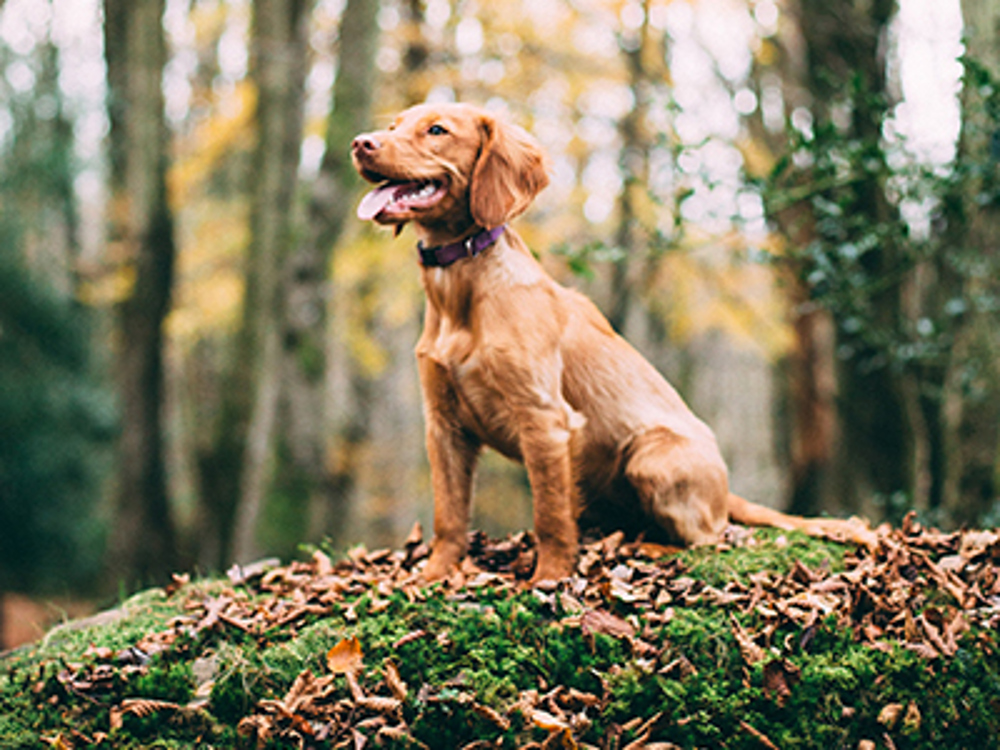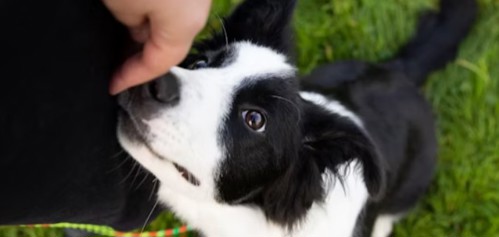
They're not the stuff of dinner party conversations, but knowing how to spot a problem could save your dog a lot of misery.
Sound familiar?
Picture the scene. You've just washed your dog from top to tail using the finest shampoo and conditioner money can buy, but even after drying him, the same horrible fishy odour you noticed pre-groom is still lingering in your poor nostrils. 'So where's the smell coming from?' you wonder. It's highly likely that your dog's smelly anal glands are the culprits.
What are anal glands?
Anal glands (or anal sacs) are relatively small glands found on either side of your dog's anus (and no, humans don't have them!). They're found just below the surface of the skin between the external and internal sphincter muscles.
The best lifetime dog insurance
Protect your dog with the UK's Number 1 pet insurer, with up to £25,000 cover for vet fees.
Why do dogs have anal glands?
Dogs usually use these glands to identify each other and mark territory by making a distinctive thick, foul smelling, oily liquid. This is the reason dogs smell other dogs' bottoms when they meet and greet, standing tense with tails erect to swap their own unique smells (a bit like individual fingerprints).
How do dogs empty their anal glands?
Unlike the skunk, domestic dogs and cats have largely lost their ability to empty their anal glands voluntarily. Your dog's anal glands may empty when walking around, especially when they're stressed, creating a very sudden unpleasant change in smell. Going for a poo puts natural pressure on the rectum walls to empty their glands which can lubricate the anal opening, making it easier for them to go.
How can anal glands become impacted?
Anal glands can fill for a number of reasons; most commonly when there hasn't been enough pressure to empty the glands, such as, after a few days of diarrhoea. Whenever they haven't emptied properly, there's a chance that glands can become blocked, impacted and swollen. If they're impacted for too long they can build up nasty bacteria, causing pain, increased swelling and sometimes even abscesses and fever.
How do I know if my dog may have a problem?
Signs of anal sac impaction can include:
a nasty fishy smell
Usually, anal gland secretions are extremely minute, so you don't usually see or smell them - though you may notice your dog's bedding becomes a bit smelly between washes. When you can actually smell the odour emanating from your dog's backside there may be a problem.
dragging or scooting their bum
Some dogs seem unable to empty their glands fully on their own, causing the glands to become impacted and uncomfortable. These dogs to drag or 'scoot' their rear-ends along the ground (or more commonly your brand-new, cream-coloured carpet) in an attempt to empty them.
having an uncomfortable bum
Other signs include licking or biting around their anal area, chasing their tail, sitting uncomfortably, or even licking paws - both front and back - in sheer frustration.
changes in colour of anal gland fluid
Normal anal gland fluid ranges from yellow to tan in colour and is watery in consistency. Impacted anal gland material is usually brown or grey and thick, with the occasional presence of blood or pus indicating infection.
Which breeds are affected by anal sac impaction?
All types of dogs can develop anal sac impaction and it’s estimated that each year around 4% of dogs are affected by it. The risk of developing anal sac impaction is higher in older dogs. Research has found that some breeds and types appear to be more at risk of developing this condition than others, including: Cavalier King Charles Spaniels, King Charles Spaniels, Crosses between Cocker Spaniels and Poodles, Shih-tzus, the Bichon Frise and Cocker Spaniels.
Find out more about breed differences and the latest research
In 2021 the VetCompass programme at the Royal Veterinary College, partially funded by The Kennel Club Charitable Trust, conducted research that looked at the veterinary records of over 104,000 dogs. Data from these dogs were analysed to look at which breeds had an increased or reduced risk of anal sac disorders.
The study found that:
- In the one year of data that was collected, anal sac disorders affected 4.4% of dogs.
- Breeds with an increased risk of anal sac disorders compared with crossbred dogs included:
- Cavalier King Charles Spaniels (3.31 times the risk)
- King Charles Spaniels (3.30 times the risk)
- Shih Tzus (1.66 times the risk)
- Bichon Frise (1.63 times the risk)
- Cocker Spaniels (1.24 times the risk)
- Breeds with a reduced risk of anal sac disorders compared with crossbred dogs included:
- Boxers (0.29 times the risk)
- German Shepherd Dogs (0.37 times the risk)
- Staffordshire Bull Terriers (x 0.56)
- Border Collies (0.60 times the risk)
- Labrador Retrievers (0.70 times the risk)
- Flat-faced (brachycephalic) dogs had 2.62 times the risk of anal sac disorders compared with long-faced dogs
- Spaniel-types had 2.09 times the risk of anal sac disorders compared with non Spaniel-types
- Dachshund-types had 1.38 times the risk of anal sac disorders compared with non Dachshund-types
- Poodle-types had 1.46 times the risk of anal sac disorders compared with non Poodle-types
How are impacted anal glands treated?
Vets will usually treat this by expression of the gland (usually far too painful in the conscious patient), antibiotics and pain relief, and even repeated flushes of the glands.
With rare cases of recurrent infection or presence of a specific type of malignant tumour, anal glands may be removed surgically. The potential complications of this specialist type of surgery, however, make the operation strictly reserved for essential cases only.
Should I regularly empty my dog's anal glands to prevent this happening?
Not all dog experts agree the anal glands should be interfered with in any way - unless the dog is showing signs of a problem. Applying pressure to an anal sac impaction or infection could cause the gland to rupture, and lead to bleeding and painful complications for your dog. Always speak to your vet for advice.
Article author
This article was written by Marc Abraham, a vet based in Brighton who regularly appears on UK television.
Think your dog may be affected?
If you're worried about your dog's health, always contact your vet immediately!
We are not a veterinary organisation and so we can't give veterinary advice. If you're worried about any of the issues raised in this article, please contact your local vet practice for further information.
Find a vet near you
If you're looking for a vet practice near you, why not visit the Royal College of Veterinary Surgeons' Find a vet page.


